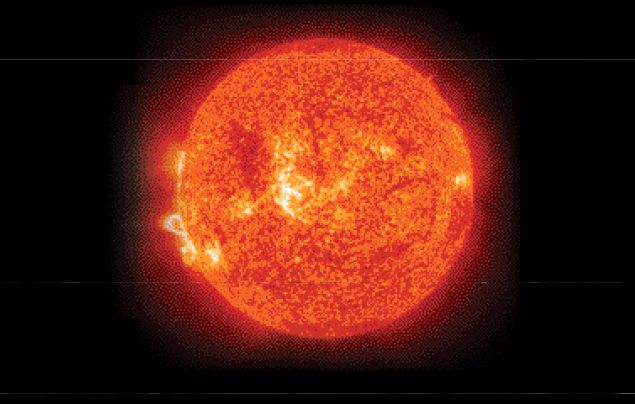Science with Dr Karl: Solar flare ahead!
Solar flares take over with Dr Karl
A solar flare! What is that?
A solar flare is a sudden eruption of brightness from the Sun’s surface. The energy released can be huge – 160 billion megatonnes of the chemical trinitrotoluene (TNT)!
As well as light, the energy of the eruption includes heat, X-rays, UV radiation, gamma rays and radio waves. But there’s more than just energy – a solar flare can also eject massive clouds of atoms, electrons and ions into space! Occasionally, the sun might also produce a coronal mass ejection – a billion tonnes of matter. The particles in this matter can cover the 140,000,000km distance between the Sun and Earth in 13 hours!
What is its effect?
Massive solar flares can set wooden telegraph stations on fire by sending huge currents down long telegraph lines, causing sparking! They can also produce amazing light shows in the sky called auroras. These are caused by collisions between electrically charged particles. Smaller solar flares have burnt out electronics in satellites and have brought down high-voltage power grids. Even solar flares that are not enormously powerful can interfere with short-wave radio communication.
Luckily, Earth’s magnetic field and atmosphere protects us humans from all of the harmful effects of solar flares.
When does it happen?
The Sun has an 11-year cycle of activity. When it’s very active we can see several solar flares every day and when it is less active, the frequency drops to less than one per week.
DID YOU KNOW? We still don’t know exactly how solar flares form. We are quite sure that magnetic energy from the Sun is turned into the energy of high-speed particles that get blasted out of space. But we don’t understand the process. In fact, we still cannot predict when a solar flare will happen!
DID YOU KNOW? On 14 July, 2000, a powerful solar flare hit Earth! It had enough energy to heat up the Earth’s atmosphere and make it expand outwards. It made the International Space Station lose 15,000 metres of altitude. The astronauts had to do a lot of rocket engine burning to boost it back to a safe altitude!
More Like General Science

RASPBERRY PI FOUNDATION’S CREATIVE CHALLENGE FAVOURITES!

10 facts about Stephen Hawking

Charles Darwin and the Mystery of Life!










LEAVE A COMMENT
THANK YOU
Your comment will be checked and approved shortly.
WELL DONE,
YOUR COMMENT
HAS BEEN ADDED!
COMMENTS
Love it! Thanks
CUSTOMIZE YOUR AVATAR